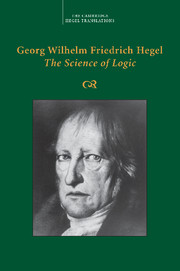Chapter 3 - The Absolute Idea
Published online by Cambridge University Press: 30 September 2021
Summary
The absolute idea has shown itself to be the identity of the theoretical and the practical idea, each of which, of itself still one-sided, possesses the idea only as a sought-for beyond and unattained goal; each is therefore a synthesis of striving, each possessing aswell as not possessing the ideawithin it, passing over from one thought to the other without bringing the two together but remaining fixed in the contradiction of the two. The absolute idea, as the rational concept that in its reality only rejoins itself, is by virtue of this immediacy of its objective identity, on the one hand, a turning back to life; on the other hand, it has equally sublated this form of its immediacy and harbors the most extreme opposition within. The concept is not only soul, but free subjective concept that exists for itself and therefore has personality – the practical objective concept that is determined in and for itself and is as person impenetrable, atomic subjectivity – but which is not, just the same, exclusive singularity; it is rather explicitly universality and cognition, and in its other has its own objectivity for its subject matter. All the rest is error, confusion, opinion, striving, arbitrariness, and transitoriness; the absolute idea alone is being, imperishable life, self-knowing truth, and is all truth.
It is the sole subject matter and content of philosophy. Since it contains all determinateness within it, and its essence consists in returning through its self-determination and particularization back to itself, it has various shapes, and the business of philosophy is to recognize it in these. Nature and spirit are in general different modes of exhibiting its existence, art and religion its different modes of apprehending itself and giving itself appropriate existence. Philosophy has the same content and the same purpose as art and religion, but it is the highest mode of apprehending the absolute idea, because its mode, that of the concept, is the highest. Hence it seizes those shapes of real and ideal finitude, as well of infinity and holiness, and comprehends them and itself. The derivation and cognition of these particular modes are now the further business of the particular philosophical sciences.
- Type
- Chapter
- Information
- Georg Wilhelm Friedrich Hegel: The Science of Logic , pp. 735 - 753Publisher: Cambridge University PressPrint publication year: 2010

